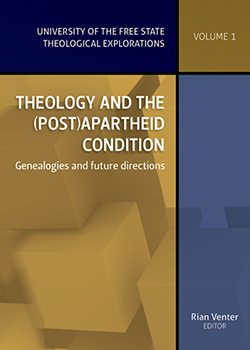Latest News Archive
Please select Category, Year, and then Month to display items
21 November 2024
|
Story Jacky Tshokwe
|
Photo Supplied
 Prof Mogomme Masoga, Dean: Faculty of the Humanities.
Prof Mogomme Masoga, Dean: Faculty of the Humanities.
On 8 November 2024, the South African Humanities Deans Association (SAHUDA) elected Prof Mogomme Masoga, Dean of the Faculty of The Humanities at the University of the Free State (UFS), as its new President. This appointment marks a pivotal moment for SAHUDA, which represents a diverse network of deans who champion the prominence and future of humanities, social sciences, and the arts in South Africa and beyond. Prof Masoga, who has served as Vice-President of SAHUDA for the past year, brings a wealth of experience and a deep commitment to advocating for the role of humanities in addressing the challenges of our contemporary world.
As President, Prof Masoga envisions broadening the influence of what he terms ‘public and applied humanities.’ His aim is to advance a humanities framework that not only enriches academic discourse, but also engages with critical global and local issues. This approach, rooted in socially responsive scholarship, will prioritise areas such as computational and digital humanities, environmental humanities, and other interdisciplinary fields that intersect with the pressing concerns of our time.
“The humanities are more relevant than ever to understanding complex societal issues,” Prof Masoga explained. “Through public and applied humanities, we can bring the critical perspectives of our field into active dialogue with the challenges of a digital and ecologically threatened world.”
His election underscores the University of the Free State's growing influence in national and international conversations about the future of the humanities. For the UFS, this leadership role enhances its reputation as an institution deeply invested in fostering meaningful contributions to society. Prof Masoga’s presidency is set to amplify the university’s voice and perspectives in SAHUDA’s mission to fortify the role of humanities in education and public life.
Over the next two years, Prof Masoga’s tenure will include a focus on initiatives that strengthen the relevance of humanities scholarship, encourage interdisciplinary research, and cultivate public engagement. He will also prioritise fostering collaboration across higher education institutions in South Africa and internationally to ensure that humanities disciplines are equipped to address the diverse needs of our rapidly evolving world.
Prof Masoga’s commitment to SAHUDA’s mission reflects the values and aspirations of the UFS Faculty of The Humanities. His presidency is an invaluable opportunity for the university to contribute to the national agenda of reinforcing the humanities as a field essential to a healthy, critically informed, and culturally aware society. This achievement serves as a proud moment for the UFS and a beacon for the potential of the humanities to drive societal progress in South Africa and beyond.
UFS research project aims to stimulate reflection on theological studies
2017-06-20

The first book in the ‘UFS Theological
Exploration’ academic series, called Theology
and the Post(Apartheid) Condition, has just
been released.
Photo: Supplied
The first study book with the title Theology and the Post(Apartheid) Condition, which is part of a new academic series by the Faculty of Theology and Religion at the University of the Free State, is now available. Volume 1, compiled by Professor Rian Venter as editor, is the first book in the ‘UFS Theological Exploration’ academic series, which the faculty plans to release.
Transformation
Professor Venter says the transformation of processes and practices in communicating and creating knowledge has become an urgent task for public universities in a democratic South Africa. Much reflection has already gone into the methods and scope of transformation in higher education.
Although the faculty has done work on the implications of this for theology, there is one area of investigation that has not received much attention. It concerns the role of theological disciplines such as Old and New Testament, Missiology and Systematic Theology and Practical Theology, and specifically the relationship between academic disciplines and societal growth. The book focuses on these challenges and contains the intellectual undertakings of the contributors who are all lecturers, research fellows and post-graduate students linked to the faculty.
The questions
The key questions addressed are: what are the contours of the (post)apartheid condition and what are the implications for responsible discipline practices in theology. Professor Venter says the chapters in the book are logically arranged and moves from wider to more specific concerns. The first three chapters suggest broad perspectives on the challenges for theology in higher education, chart the changes, and make some suggestions for the future.
A dynamic field of study
The book states that theology has already experienced profound and radical changes over the past decade, which is known to us. All the chapters demonstrate these fundamental shifts, which have taken place in all theological sub-disciplines. Professor Venter says the contributions in the book illustrate that theology is a dynamic field of study, and is pursued with enthusiasm and commitment. Not all disciplines in theology are investigated for the book. However, the studies reflect the interests of the theologians in the Faculty of Theology at the UFS. Professor Venter hopes that the volume might stimulate further reflection of a similar nature by other theologians.
New insights
Through the ‘UFS Theological Exploration’ research series, the faculty hopes to stimulate new insights and new developments in academic progress and overall human growth. Series editor Professor Francois Tolmie says it is a fact that strong university research is necessary to achieve academic progress and advance human prospering. He says the faculty's research series will make a valuable contribution to these causes. Professor Tolmie says the ‘UFS Theological Explorations’ contains research of the highest academic standard which has been peer-reviewed to make significant educational contributions to core theological issues in South Africa and overseas.